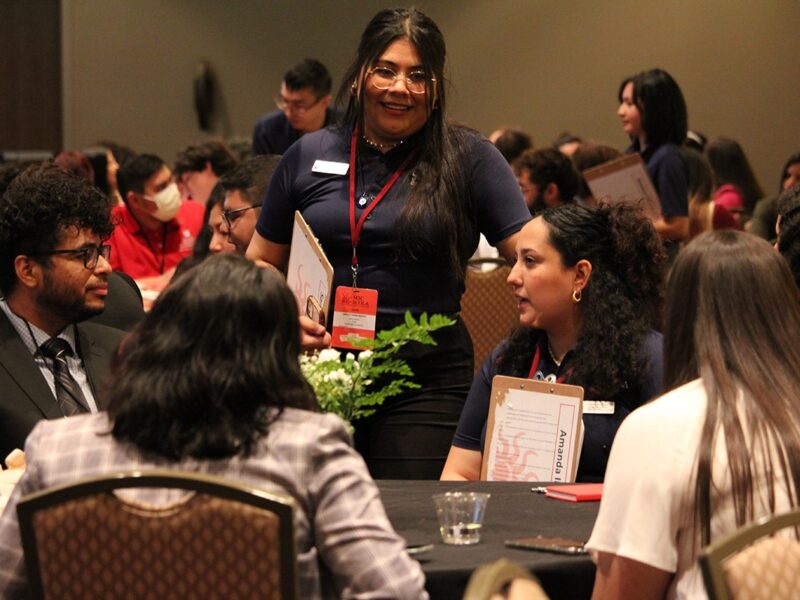E. Lisako J. McKyer…The Road Less traveled
There are many who take the “normal” route through college, starting in their late teens and finishing up in their early 20s. Then there are others who find their calling later in life, after living in two countries and running their own business. That’s the road less traveled — or more, in this case — by Dr. E. Lisako J. McKyer, who heads the Child and Adolescent Health Research Lab at Texas A&M University.
Diverse Beginnings
For McKyer, the road begins her in homeland of Japan. The daughter of a Japanese mother who can trace her family back almost 700 years and an African-American father, McKyer lived in Japan until moving to America in her adolescent years. While for others it may a decision of choosing one culture over another, for McKyer, whose second language is English, both cultures are represented and respected.
“Well, you take off your shoes when you come in my home,” McKyer says. “We speak ‘Japanenglish’ in our home – even my husband does! And…don’t be surprised if you’re served barbeque, collard greens, seaweed salad and miso soup at our house.”
McKyer’s college path was not that of the “traditional” student. After a career as a kitchen and bath designer and operating an educational children’s toy store, McKyer started her college career at age 26. She earned her B.A. in psychology from California State University, Northridge and went to Indiana for doctoral work in clinical psychology specializing in child/pediatric psychology.
There, McKyer minored in public health, completed all the course work and then flip-flopped majors. In the end, she majored in health, minored in psychology and statistics and had enough credits to be awarded a MPH in community health. She earned a Ph.D. shortly thereafter.
With such an unorthodox road to college, McKyer typically says upon hearing her students’ concern about staying in school longer than normal: “Hmm…I guess I didn’t get that memo that I should have finished sooner.’”
The Work and Reward
McKyer has been at Texas A&M since the fall of 2006, examining the socio-ecological factors influencing child and adolescent health status and health behaviors. Since arriving here, McKyer has been running the Child and Adolescent Health Research Lab (CAHRL). She started CAHRL at a previous institution, but McKyer says she is pleased with how the program has blossomed here.
“CAHRL succeeded beyond my wildest dreams,” she explains. “I have enough external funding to hire a deputy director (Dr. Christine A. Tisone) and we fund fully or partially five to seven doctoral students and three master’s students. This spring, we had more than a dozen undergraduates apply for unpaid research assistant positions in CAHRL.”
McKyer is a lifetime member of Psi Chi (Psychological Honorary Society) and Eta Sigma Gamma (Health Education Honorary). She’s also a member of the American Academy of Health Behavior, the American Public Health Association and the Society for Research in Child Development.
First Impressions Matter
When McKyer left her previous institution, she interviewed at several universities. She says the care of the faculty and staff here convinced her that Aggieland was the right choice.
She was provided a hotel room at the Memorial Student Center so she could be near her newborn daughter, and the interview was extended across nearly three days so she could schedule regular breaks every two to three hours so she could nurse her daughter.
“There are many places that say they are family friendly, but when you cross the threshold, you find that what is stated and what is practiced are not the same,” she says. “However, the way I was treated here during my interview – the support I had in terms of my family’s needs – indicated that HLKN walks the talk.”
McKyer said when she met Steve Dorman of the College of Medicine, he told her of a time when his wife had been asked to nurse her baby in the restroom.
“As a health educator, he did some research and learned that the number one predictor of a woman’s decision to quit breastfeeding was lack of support from her partner,” McKyer says. “Since then, Dr. Dorman found a way to insert that tidbit in whatever class he was teaching.”
McKyer’s feelings of being warmly received on her first visit at Texas A&M continue to this day. Now the mother of a 5-year-old son, and 3-year-old daughter, McKyer says she finds that all voices and backgrounds are welcome in the department.
“My background in psychology –- at both the undergraduate and graduate levels — slants my orientation more toward behavioral scientist/researcher than health education researcher,” she says. “Indeed, our graduate students often have more practical and professional health education experience than I do. Rather than it being a problem, the Health Education Division faculty has embraced my training and orientation – making it clear that I ‘round out’ the expertise in the program rather than detract from it. So I’m able to do what I enjoy doing (and am good at doing), but still feel valued and appreciated by my colleagues – especially my senior colleagues.”
Media contact: tamunews@tamu.edu.





